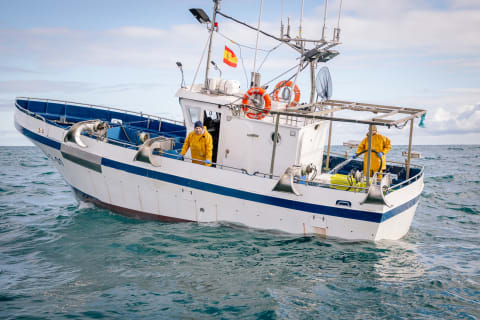Though overfishing rates in U.S. waters have actually dropped recently thanks to stricter regulations, globally we’re still plucking more fish out of the ocean than can be replenished naturally. According to a 2018 report by the U.N., 33% of the world’s marine populations are currently overfished, and nearly 60% are at max capacity. Only 7% are being underfished. Unsurprisingly, the species whose futures are threatened by overfishing are the ones we love to eat the most—your salmons, tunas, halibuts, and the like—while smaller fish populations are less likely to be tapped out. Eating seafood that’s lower on the food chain can take pressure off of larger threatened species and boost ocean health as a whole. In nature, everything is interconnected, and when one species begins to decline, the entire ecosystem feels it in some way. That’s one reason Patagonia Provisions, the food arm of outdoor retailer Patagonia, chose to release its own line of tinned mackerel late last year. Beyond being a more sustainable swap for canned tuna fish or filets of larger fish, small canned fish are rich in protein1; vitamins B12, D and A; and omega-3s (especially when they’re preserved in high-quality olive oil). By the nature of their place on the food chain, smaller fish are also less likely to contain mercury and other pollutants, which accumulate with each feeding in a process called biomagnification. Tinned fish can stay fresh for up to seven years, which means that people have plenty of time to take advantage of these nutritional benefits. The health, convenience, and sustainability of tinned fish are reason enough to give the protein source a try. If you’re a flexitarian who already swaps out the occasional hamburger for a veggie patty, why not switch up your usual fish order next? Alex Raij, the James Beard recognized chef and owner of four Spanish-inspired restaurants in NYC, is partial to straining off the can’s oils and saving them for the base of a salad dressing, then serving the remaining fish with vinegar-soaked onions and fresh herbs. “You can also flake the fish into a tart shell, mix it with a little aioli made from its oil, and breadcrumbs, and bake until browned,” she says. Clearly, the sky (sea?) is the limit for this low-maintenance protein. Emma received her B.A. in Environmental Science & Policy with a specialty in environmental communications from Duke University. In addition to penning over 1,000 mbg articles on topics from the water crisis in California to the rise of urban beekeeping, her work has appeared on Grist, Bloomberg News, Bustle, and Forbes. She’s spoken about the intersection of self-care and sustainability on podcasts and live events alongside environmental thought leaders like Marci Zaroff, Gay Browne, and Summer Rayne Oakes.



